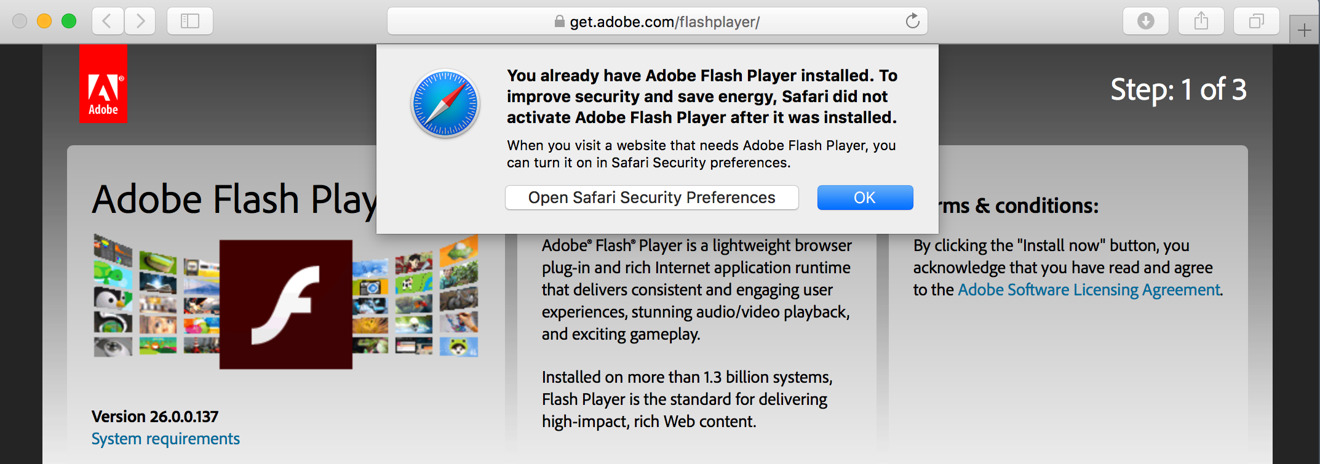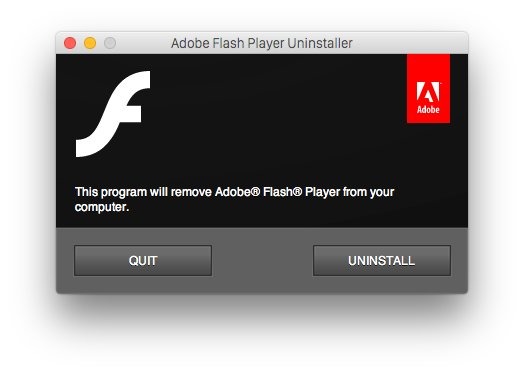Citing pressure from HTML5, WebGL, and WebAssembly, Adobe has announced that it will end development and distribution of Flash Player at the end of 2020, and encourage content creators to migrate any existing Flash content to open formats.
Adobe cites collaboration from Apple, Facebook, Google, Microsoft and Mozilla as impetus behind the decision.
"The mobile era is about low power devices, touch interfaces and open web standards — all areas where Flash falls short." - Apple's Steve Jobs in 2010
In a statement on the matter, Apple says that its users have done without Flash for some time, and notes that the iPhone, iPad, and iPod touch have never supported the technology. Safari now requires explicit approval for each website before it executes the Flash plug-in, which must be actively installed by the user.
Adobe will continue to support Flash on most of the browsers that currently support Flash through the planned dispatch of the product. The company notes that this includes issuing regular security patches, maintaining OS and browser compatibility and adding features and capabilities as needed.
Killing off Flash doesn't mean that Adobe is giving up on developing web standards. The company will continue to continue to contribute to the HTML5 standard and participating in the WebAssembly Community Group.
The announcement comes more than 7 years after Apple cofounder Steve Jobs published his famous "Thoughts on Flash" letter, in which he slammed Adobe's web format as outdated and not suitable for portable, low-power devices. At the time, the absence of Flash support on the iPhone and iPad were common criticisms against Apple's mobile platforms, but in the years that talk has all but disappeared.
Jobs's issues with Flash were numerous, related to security, performance, battery life, and the fact that it is not designed for touchscreen devices. Instead, Apple opted to back its own App Store, as well as open web formats like HTML5 — a bet for the company that proved prescient, even before Adobe announced the death of Flash on Tuesday.
"Flash was created during the PC era - for PCs and mice," Jobs wrote in 2010. "Flash is a successful business for Adobe, and we can understand why they want to push it beyond PCs. But the mobile era is about low power devices, touch interfaces and open web standards - all areas where Flash falls short."
Since Jobs's letter, modern browser makers have increasingly veered away from Flash, which while once useful for games, video, and animation, has largely been supplanted by other technologies — namely HTML5 — that pose less of a security threat. For a number of years Flash was one of the main vectors for attackers, forcing Adobe to issue regular patches.
Apple escalated its position against Flash last year with the launch of macOS Sierra. Adobe's plugin is disabled by default in Sierra's version of Safari, forcing people to manually activate whenever they encounter a webpage asking for it. Java, Silverlight, and even Apple's own QuickTime are treated the same way.
Google also announced its move away from Flash with its PC Chrome browser in August of 2016, revealing its plans to block some specific applications of Flash, including behind-the-scenes operations like page analytics. The switchover came in Chrome 53, which launched later that month.
 Mike Wuerthele
Mike Wuerthele
















 William Gallagher
William Gallagher

 Christine McKee
Christine McKee
 AppleInsider Staff
AppleInsider Staff
 Chip Loder
Chip Loder

 Malcolm Owen
Malcolm Owen









55 Comments
At my company, we're hard at work to move our applications way from Flash. It will be at least another year. Glad Adobe has an appropriate road map.
Great! Let's start by forcing Comcast, ESPN, NBA, and CNN to only use HTML5 and not link to any sites that still use Flash--and I'd like to see that happen starting today, not after 2020. Every one of these sites use HTML5 or other non-Flash when accessed by iOS devices, including Safari on macOS when setting the user agent to iOS so we all know they can do it now.
It will take 13 yrs but Steve did kill Flash.
Better late than never.
This is good news but getting already constructed websites to be updated may prove hard. I have had to write to my son's school many times when they have set web based homework using sites that require Flash. As an Apple only family my son has been unable to do the homework due to our lack of Flash on our iMacs. l believe this is discriminatory and may result in no marks. The school has always been good about the issue but the homework still continues sometimes to be Flash based. I expect most of the teachers have no idea about the problems with Flash and many owners of older websites have not got resources to update their web pages.